
Part 5:
1945 to 2020: The Big Picture
#92 Nigeria and the Democratic Republic of Congo
In this blog, I have chosen to explore the examples of Nigeria and the Democratic Republic of Congo to show why countries rich in mineral resources still maintain high levels of people in deep poverty. Nigeria is important as an example as she has been pumping oil for decades. Out of the payments received by the Nigerian State, a new ruling class has arisen that are hugely wealthy. While the Democratic Republic of Congo is the example of my argument. The Democratic Republic of Congo is a huge territory in terms of size. She is blessed with every imaginable commodity. Yet, the Democratic Republic of Congo is one of the poorest countries on our planet.
#85 China and the rest of the World
Chinese foreign policy in the period from 1949 to 2000 was largely defensive and determined to maintain the revolution. Only after the Chinese treasury was replete with US dollars, and after they began to accommodate American and other western global companies, could they begin to develop a global policy. This was part of the story; the other vital aspect was the lesson they learned from the Soviet collapse in 1991.
#82 China’s Economic Transformation and Mao Zedong
Mao knew about the English agricultural revolution in the 16th and 17th centuries, and he knew about the industrial revolution in the 18th century too. He was aware of the need to transform China.
Mao’s heritage has caused huge debate and disagreement, particularly across Western intelligentsia. Mao made serious mistakes at the end of his life. By the 1960s, he was in a hurry. He also wished to show the Soviet Union that China was independent of their advice.
Mao created the Hundred Flowers Campaign; the Great leap Forward; and the Peoples Commune. All these vast initiatives came under the rubric of the Cultural Revolution.
#73 Tax Havens and the World's Rich
Half of the world's trade is said to pass through the tax havens. Trillions of US dollars have managed to avoid tax. In some sense, crime and corruption have come to be accepted as normal business. There has been a significant public outcry at the existence of these havens, not least because the rich are not taxed in a fair and just manner. Whistle-blowers have managed to expose those using these tax havens, embarrassing wealthy firms and individuals.
#70 The ‘Third World’ & Development
Senator Joseph McCarthy led a government-supported campaign from the late 1940s to the late 1950s, to rid the USA of anyone with left-leaning tendencies. It was argued at the time, with justification, that he set up a witch hunt to track down subversives: people antagonistic to the high ideals which USA ideology had persuaded themselves was their own God-given destiny. McCarthy and his allies were consumed by fear and paranoia as if American civilisation was about to be taken over. The campaign was focused on people in academia, the arts and entertainment, labour union activists, and those in public service. These were accusations of subversion or treason, often without proper evidence.
#69 Development Aid: The Master Stroke
The mechanics of the West German recovery is a tale rarely told. The Marshall Plan was the means through which the Americans channelled money for the recovery of all states in Europe in the Western sector and Japan. The USA had 80% of the world’s gold supply, so could well afford the largesse needed by all the collapsed economies. Over the four years, $13 billion (equivalent to well over $100 billion today) or 0.5% of the USA Gross Domestic Product (GDP) was channelled into dollar-starved Europe
#62 Independence, Democracy Freedom from Colonial Rule
All the old colonialist powers in Europe lost global power. After 1945, the USA consciously decided that it had a ‘competitive advantage’ over all other states. She was sufficiently strong economically that she did not need colonies to take a globally dominant position. During her discussions with Britain in 1943, she laid down that one of her prime conditions for the peace was that all colonised countries were to be open to USA trade. By 1945, the USA was sufficiently powerful to enforce this decision against the wishes of the older colonising powers in Europe and Japan.






